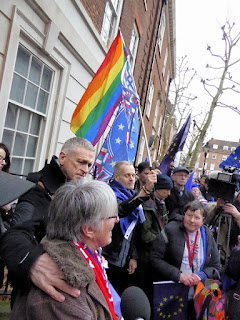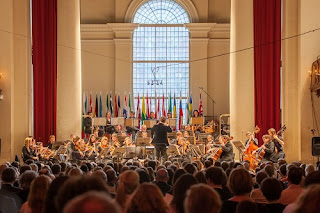We were warned: skip the processional bit down Whitehall and past Parliament Square, and just go straight to Smith Square; the English Defence League is out in force to 'celebrate' Brexit Day. Not to be intimidated, a smallish crowd (maybe 200?) of REUniters - as I suggest we call ourselves - gathered as instructed opposite Downing Street between 2.30 and 3pm on the afternoon of the inauspicious day, ready to thank the European Commission Representation in London for all it had done over the years.
Organiser Peter French later told me that even he, the veteran campaigner and the man behind this splendid float on our last March of the Million, which you can see properly sideways on in that post but more obliquely from behind here,
was worried, and thought about abandoning the first bit. But I'm glad to have gone through the fire. The EDF horrors were parallel to us, separated only by a handful of police, megaphoning their hate, and some darted in between us yelling obscenities in our faces. But thanks to Orpheus Henrik Tideman with his zither,
we sang the Ode to Joy over and over, ever louder, and saw them back off bewildered. So grateful to the friends who did come - Henrik, Henrietta Foster, Claudia and Stephen Pritchard (Claudia stylish as ever in her EU wear), Sophie glamorous in black centre.
One good thing: there were possibly as many international radio and TV media folk as us. We all got collared to talk at one point or another. I was asked by an English lady representing ORF if I didn't think we were being provocative. And I said that we were offering no provocation at all, just wanting to honour an honourable institution, and that provocation was coming from the other side; we would not rise to it. Also made the acquaintance of til-then-MEP Julie Ward, who sported one of the scarves we saw them wearing proudly in Brussels.
Once past the Houses of Parliament, we lost the trolls and all proceeded as normal towards St John's and the European Commission in Smith Square.
It's a shame no MPs were in evidence - the partner of one said he'd been too afraid to come and had stayed home. Really. But we did get splendid speeches from Peter
and Julie.
They came in the nick of time, as we were wondering how many more times we'd have to infill by interlacing the Ode to Joy with 'Auld Lang Syne' , which we were briefly seen delivering on Channel 4 News (Latvian friend Kristaps contacted me to say he'd seen it - that is definitely not me on the right, contrary to some unkind friends who suggested there was a resemblance, but we are to be seen at 5m02s),
Fortunately that wasn't the point at which we were railroaded into singing it to some really not very good words, lambasting Parliament inter alia when we know that the House as a whole saved us so many times before the blow of the Toron majority fell and along with it a darkness we must shine light on at every possible opportunity (though it seems that the Prime Monster and his Chamber of Horrors are doing a pretty good job of shooting themselves in their unsteady feet at every opportunity). Still, Orpheus Tideman was definitely the hero
until along came Madeleina Kay, #EUsupergirl and Young European of the Year 2018, whom I'd long wanted to meet. That's her cape up top, and here she is both singing her own composition, which we were able to participate in,
and with the cape behind her.
Not sure where she'd come from, but out of one of two Minis emblazoned with 'Bollocks to Brexit' stepped my old sparring partner on LinkedIn Peter Cook, who launched into some very amusing Chaz-and-Dave style numbers, the only drawback being that they weren't quite current, since Mrs Mayhem was very much a target. But a bit of nostalgia was welcome in the mix; this was a broad Remain church, serving up a varied divertissement (that word is French, pace W S Gilbert).
There was also an unfathomable kind of performance artist playing the widow bereft of Europe.
She wandered off as we continued to chat to some nice people from Maidenhead and a couple who were preparing for a candlelit vigil. Otherwise, folk had melted away as the grey declined into sombre night, and I went off with Hen for a plate of dependably generous pasta at Sapori round the corner.
The evening was consoling too: with J hosting a farewell dinner for a work colleague at the Garrick, I went off to bask in the always fabulous Stockwell hospitality of Katharina Bielenberg and Jamie Bulloch, hosting a relaxed gathering (with superb food as always) for Timur Vermes, whose latest novel, The Hungry and the Fat, Jamie has just translated from the German (confession: his book about Hitler returning, Look Who's Back, hasn't stayed with me). Speeches were given by Christopher MacLehose, Katharina's boss at that great press, and Timur, shortly before 11pm, and as I stepped out it seemed that Remainer neighbours were having a jolly party of their own. The journey home around midnight was uneventful.




















































